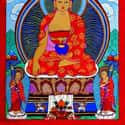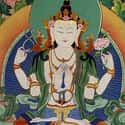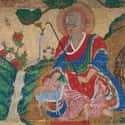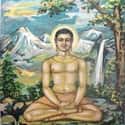-
(#10) A Full Moon Day Is Sacred
Every religion has their one uber-holiday of the year. For some it's Christmas. Others Dwali. Some people give thanks on that magical day of the year when the McRib finally makes its triumphant return.
Although Buddhism isn't exactly a religion in the traditional sense, it's not without its own special day to celebrate the spiritual journey that so many others are on.
That day is called "Uposatha", a day for the "cleansing of the defiled mind," which falls in accordance of the four lunar phases, starting with the full moon.
On Uposatha, Buddhist followers intensify their practice, reflecting on their goals to deepen their commitment to themselves and to others.
-
(#5) Sex Is Sometimes a Complicated Subject
For a religion that encourages the exploration of one's self, sex (both with a partner and without) surprisingly comes with some very serious rules.
First of all, if you're a Buddhist monk or nun (referred to as Bhikkhus and Bhikkhunis, respectively), you better keep that inner temple to yourself because any act, including masturbation, prevents one from achieving supreme enlightenment.
For the rest of practicing Buddhists, the rules aren't quite as strict - though most of them are certainly frowned upon. Particularly because the Buddha perceived the craving for sex as a form of suffering. To that end, if one is consumed by the their sexual urges, they too will not be able to reach enlightenment.
-
(#4) Women Can Never Achieve True "Buddhahood"
When Buddhism first began, some of the Buddha's teachings about women were very controversial. Not because he taught that women should be subservient to their husbands (as was the case with most early religions), but that husbands should also respect their wives.
Furthermore, while women were certainly not excluded from the religion (and were actively encouraged to participate), there came some caveats, with the worst of all being perhaps the entire point of Buddhism in the first place:
Despite her dedication to the religion, a woman can never achieve true "Buddhahood."
-
(#14) The Fig Tree Holds a Special Meaning
Specifically, the ficus religiosa, a type of fig tree that grows only in southwest China. It earned its divine name for a very specific reason: it was under this type of fig tree that Siddhartha Gautama (Buddha) first achieved his spiritual enlightenment. Ever since, it has been regarded as sacred, and is a celebrated symbol in Buddhism.
-
(#3) There Is No Divine Creator
Just imagine no one looking over your shoulder, checking for sins. No one whispering in your ear to do the right thing. Not having to answer to anyone on a Sunday morning.
Such is the way with Buddhism, where there is no "divine creator" lording above. True, there is the concept of the human spirit that dwells within, but the idea is more in sync with our consciousness, rather than with an entity that will eventually make its way up to heaven and join one of many hypothetical "big guys upstairs."
Instead, Buddhism focuses on the journey of oneself to our own enlightenment rather than seeking the approval of a higher power.
-
(#2) Siddhartha Guatama Was the "Real" Buddha
The real Buddha, however, was a twenty-nine year-old man named Siddhartha Gautama of Lumbini. Born into wealth, Gautama eventually realized that none of his fortune satisfied him, and he took to studying various religions and meditation practices around the world, before eventually becoming "enlightened," and ultimately founding Buddhism.
Perhaps ironically, the name "Siddhartha" is Sanskrit for "He Who Achieves His Goal," a concept which underlines the core intent of Buddhism.
New Random Displays Display All By Ranking
About This Tool
Buddhism is one of the three major religions in the world, which is called together with Christianity and Islam. From the 6th century BC to the 5th century BC, Shakyamuni was founded in ancient India. Since then, it has been widely spread in Asia and around the world, and has had a significant impact on the social, political and cultural life of many countries.
Most countries generally believe that Buddhism originated in India, which dissatisfied the Nepalese. Buddhism values the progress and enlightenment of the human mind and morality. The random tool explained 15 super interesting things about Buddhism that you do not know.
Our data comes from Ranker, If you want to participate in the ranking of items displayed on this page, please click here.
















